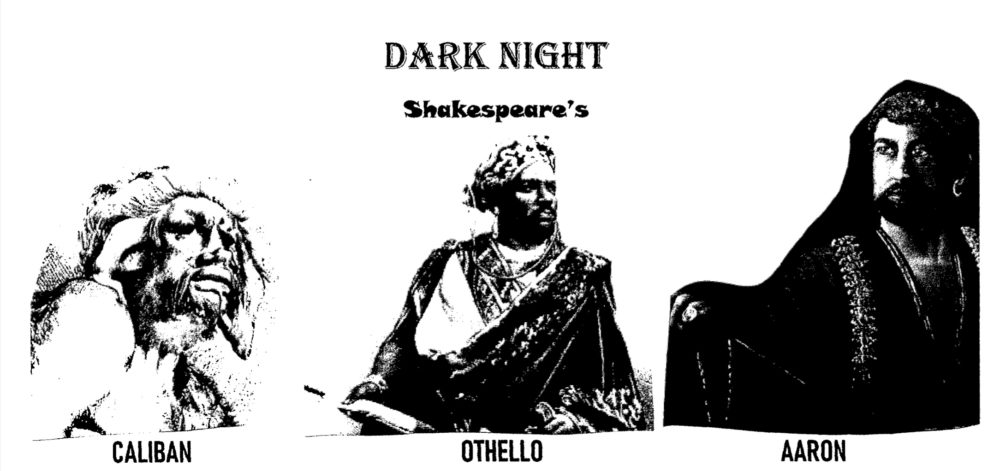
Aaron, Othello, and Caliban. Two Moors and a monster. Three representations of the Other in plays written for a white audience centuries ago. English Professor John Reilly has reinterpreted these three classic Shakespeare characters for his new novella, Dark Night, which turns Shakespeare’s portrayals of his major, highly provocative Black male characters on their heads and opens new portals to essential discussions of extant white supremacy, racism, and misogyny in art and life. The spoken-word performance stars Will Dixon as Kenneth, Othello, Aaron, and Caliban; Karen Tarleton as the narrator; and Doug Burch as Carwyn Haight, the story’s antagonist, as well as Prospero, Brabantio and Titus Andronicus.
According to Reilly, academia has circumscribed Shakespeare for too long, supporting a white Eurocentric interpretation of his plays while suppressing any subversive analysis of race, gender, or power. An example of this is the rare (but nonetheless continued) production of Othello in which the titular character is portrayed as a “swarthy Italian” in spite of the play’s repeated references to his Blackness. However, during the “age of Trump,” universities across the country have been called to reckon with racism and white supremacy within the institution. At LMU, we are urged to join a collective commitment to anti-racism. For Reilly, this makes an ideal moment to showcase Dark Night, a story that was inspired by moments of racialized condescension experienced while working at LMU.
How can words and characters created by a white man four centuries ago so profoundly address the issues of modern-day racism and white supremacy? Because, at the end of the day, characters like Othello, Aaron and Caliban—and the racial prejudices they must endure—are “deeply grounded in the human character and the human experience, which doesn’t really change over time,” Reilly says. Shakespeare had the ability to “see things in the human experience that need to be portrayed and that are enduring and eternal. There’s something in artistic genius that anticipates that discussion will occur on these topics beyond one’s own specific moment.”
Reilly brings his own genius to Dark Night. In opposition to academia’s traditional attempts to avoid “Africanizing” Shakespeare, Dark Night aims to “dismantle and deconstruct traditional ways of looking at” the playwright’s most famous Black characters. Reilly draws on a rich tradition of liberatory interpretations while making an effort to seamlessly blend his voice with that of Shakespeare’s so one can’t tell when one ends and the other starts. Therefore, the work provides a new lens to view Shakespeare’s major black figures, and, in the words of Will Dixon, acts to “unwind centuries of dogma around these characters and their interpretations.”
Beginning in the 1970s, college professors, including one of Reilly’s, began framing Caliban as a caricature of Africans enslaved in the Caribbean and a symbol of European conquest of the Indies. Caliban was a central figure for the scholars of that era who were radicalized to reform academia from its white supremacy and racism. Like those professors of his youth, Professor Reilly hopes that listeners of his own work will come away with a better understanding of Shakespeare, but more importantly, with a greater awareness of the willful shortcomings of their previous educations on his plays.
Please join us for the performance of Dark Night on Monday, November 1, at 7:00 pm PDT. The Zoom meeting ID is 896 0640 4144.



